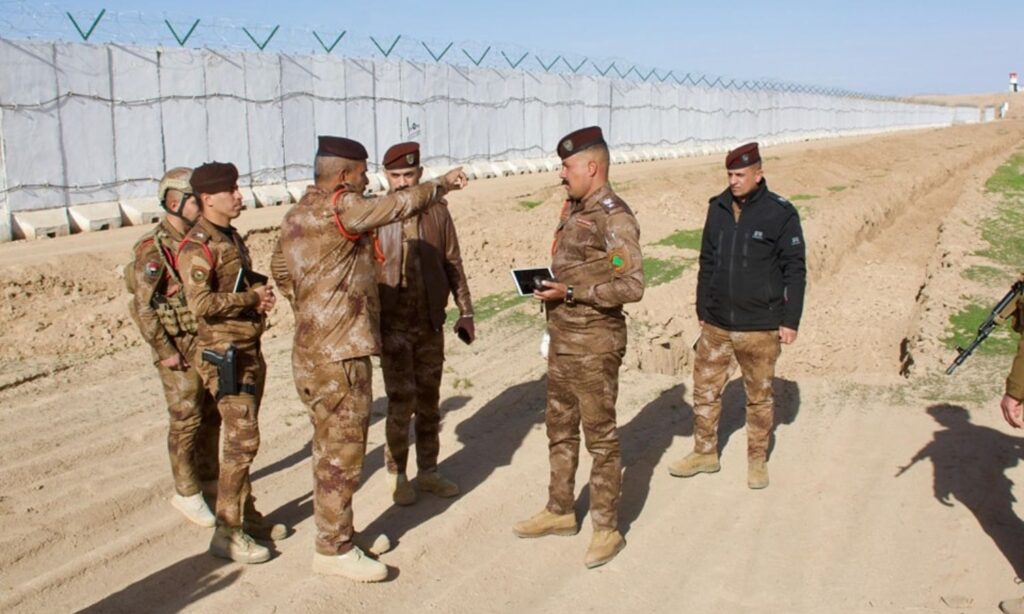The Iraqi government announced the completion of 400 kilometers of the concrete wall between the Iraqi and Syrian borders.
The head of the Security Media Cell, Major General Tahseen al-Khafaji, stated to the Iraqi News Agency (INA) that the border with Syria is fortified, confirming a move to increase security forces along the border.
Al-Khafaji pointed out that work on the concrete wall continues along the 615-kilometer Iraqi-Syrian border, with 400 kilometers completed, while the remaining 210-215 kilometers will be finalized later in the middle of the year to eliminate any security breaches on the border.
He added that the Ministry of Interior, the Ministry of Defense, the Joint Operations Command, and the Popular Mobilization Forces have “taken stringent measures that have allowed us to secure the border with the Syrian side for more than three years.”
The Iraqi official confirmed that there is a plan to increase units in that area, “in addition to the ongoing efforts of security forces working around the clock through intelligence efforts and continuous pursuit of sleeper cells, as well as ongoing airstrikes against the Islamic State group.”
He noted that “the stability of the Iraqi-Syrian border is very significant from our side, as we do not allow any breaches toward Iraq.”
On November 5, 2024, the Iraqi Ministry of Interior announced a plan to expand the construction of a concrete wall on the Iraq-Syria border.
Iraqi Border Forces Commander Mohammed Abdul Wahab Sukar stated that the plan includes building a concrete wall extending over 100 kilometers north and south of the Euphrates River, between the city of Treifawe in western Anbar province and the city of al-Bukamal in the Deir Ezzor countryside.
This is the second measure taken by Baghdad after completing a concrete and barbed wire security wall at the end of 2023 between the town of Rabi’ah and the city of Sinjar in Nineveh province, opposite the city of al-Hasakah controlled by the Syrian Democratic Forces (SDF).
In recent years, the Iraqi government has taken several measures to secure its border with Syria, including installing thermal cameras, digging trenches, and erecting a concrete wall to prevent the infiltration of “terrorists.”
In 2020, Iraq, with Western support, officially launched a project to secure the border with Syria adjacent to Anbar and Nineveh provinces, which continue to witness infiltration operations, as well as drug smuggling activities coming from Syrian territory.
Iraq shares four official crossings with Syria, which are Simalka in the Khabour region of Duhok province, Rabi’ah linking Nineveh and al-Hasakah provinces, and the al-Bukamal-al-Qaim and al-Waleed-al-Tanf crossings connecting Anbar and Deir Ezzor.
On December 26, 2024, an Iraqi security delegation, headed by the head of Iraqi intelligence, Hamid al-Shatri, visited the Syrian capital Damascus and met with the new Syrian administration’s head, Ahmed al-Sharaa, in the first visit by an Iraqi government delegation to Syria since the fall of the deposed president Bashar al-Assad’s regime.
Iraq’s Prime Minister’s foreign relations advisor, Farhad Aladdin, revealed that the purpose of the Iraqi delegation’s visit to Damascus was to learn about the recent developments in Syria and how the new Syrian administration deals with issues of concern to Iraq, adding that “the security aspect related to the borders and the fight against the Islamic State is one of the issues that concern Iraq.”
The Iraqi official pointed out that the Iraqi government “expressed its concern about the developments in the situation in Syria due to the existence of armed organizations and elements of the Islamic State, and began operations to enhance security along the shared border.”











